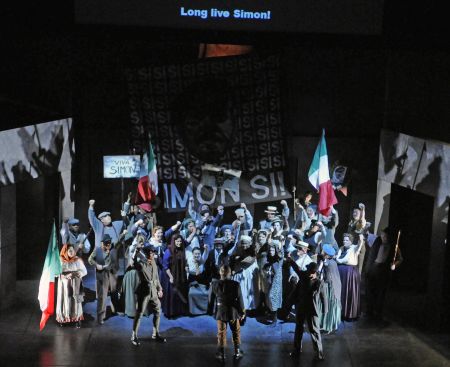It is always a little chancy for the smaller opera companies to stage productions that aren't instantly recognizable to their audience. Even casual operas fans know the basic storylines of the most popular operas, they have their favorite arias and characters, and they can hum the music here and there. I've been watching operas since I was a child, my first and only exposure for many years through the Metropolitan broadcasts on PBS. Until Kentucky Opera announced their season, I had never heard of Simon Boccanegra even though Verdi is one of the titans among opera composers. While I did a little research into the story and the characters and listened to a few clips, I mostly came to the production fresh without any particular preconceptions. I think this is an exciting way to approach an opera.
I found this production to be satisfying on many different levels. The Louisville Orchestra, led by Conductor J. David Jackson, handled Verdi's music deftly. There seems to me something lean and muscular about it, befitting the action of the plot. The updated setting to early 20th century Italy between the wars worked without too much contortion to mirror the dangerous political turmoil of Boccanegra's rule in Genoa as Doge. And if there is one thing that is timeless, it is the ruthless ambition of politicians and their cronies, leading them into disillusion and betrayal.
Simon Boccanegra is a story both of the public man's rise to power and the private man's personal struggle in losing his family. The Prologue sets all in motion with Boccanegra returning from war to claim the hand of the woman with whom he has already fathered a child. The woman's noble father Fiesco tells him that she has died and vows never to forgive Boccanegra for his wrong, made worse by the fact that the child of their union has disappeared. Just at this moment of deepest tragedy, Boccanegra is elected as Doge. When Act I begins, 25 years have passed, Boccanegra is at the height of his power. Without belaboring the complicated twists of the plot, Boccanegra and his now-grown daughter are finally reunited, but the lurking dangers of revolt and revenge inevitably encroach on the happiness of both.

Malcolm MacKenzie as Boccanegra and Inna Dukach as Amelia (Photo credits: Patrick Pfister)
Malcom Mackenzie fulfills the title role with strength and clarity. We see both the bravado and confidence of the leader tempered by the gentler side of his nature when he discovers his daughter, Amelia, played by soprano Inna Dukach. This is very much a man's world, and with the exception of the women in the chorus, Amelia is the lone female voice in an opera dominated by men. There is very little of lightness and no humor to leaven the rather gloomy proceedings. The closest we get to a moment of joy is when Amelia sings about the arrival of her lover Adorno. Even this is weighted by the melancholy story of her lonely childhood and the expectation of danger that awaits Adorno because of his machinations against the Doge. Dukach's sustained notes hover beautifully and she sings with a graceful fluidity that briefly elevates the overall heaviness of the story.
Unlike many operas, the show-stopper moments are not individual arias but the interplay of voices in duets, trios, and ensembles. Personally, I love the layering of vocals in these moments, and some of the best ones are between the deep bass of Mikhail Svetlov's Fiesco and Mackenzie's baritone, both in the Prologue and then in the final act when these two old adversaries finally lay aside their differences just as Boccanegra is dying. In the final death scene, Boccanegra blesses the newly married couple, Adorno and Amelia. I couldn't help but wonder how much this scene was in the minds of the creators of the musical Les Miserables (I actually found a lot of parallels between the two), as it very much reminded me of the similar scene between Marius, Cosette, and Valjean. There are even traces of the Javert/Valjean relationship between Fiesco and Boccanegra.
My lasting impression of Simon Boccanegra from this production is one of stark and somber beauty. There is no fluff here, no dazzling finery (the costume design by Holly Jenkins-Evans is true to the period), and no comic relief. The cast, which also includes tenor Jason Slayden as Adorno and Troy Cook as the treacherous Paolo is very strong. I highly recommend it to those who may be thinking of taking in the final matinee performance at the Brown Theatre tomorrow at 2p.m. I think you'll find very much to admire in this well-directed and handsome production.
Call 502-584-7777 or visit the box office online for available tickets.



